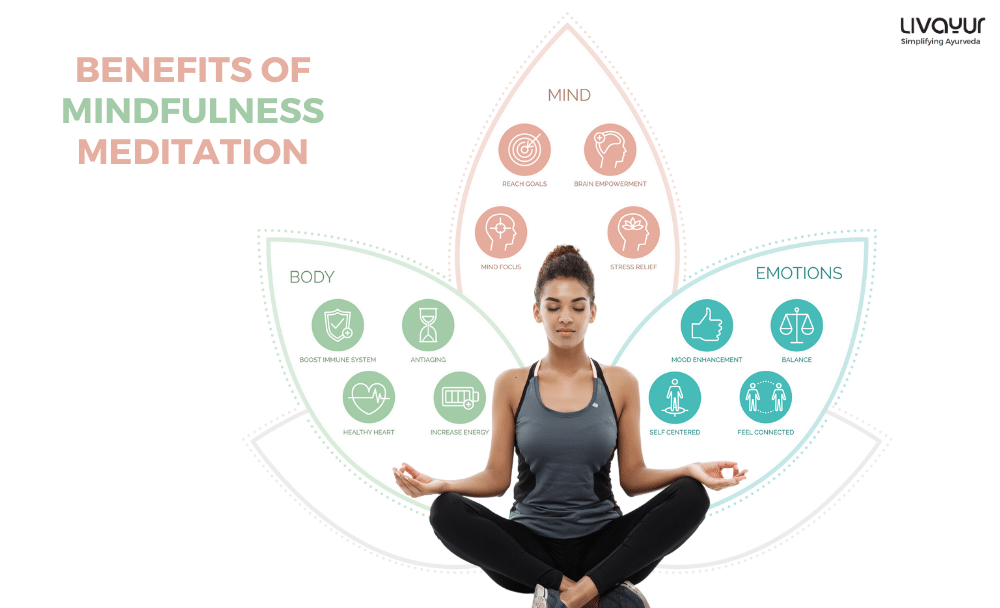
Mindfulness is a healthy mental health practice that helps to increase your awareness of the present moment. It is a meditation technique that trains your mind to pay attention to your movements, thoughts and sensations, without passing any judgment.
There are many benefits of mindfulness, some of which are even confirmed by scientific studies and research. It is considered one of the best ways to declutter your thoughts and improve your physical, emotional and mental well-being.
10 Benefits of Mindfulness Meditation
- Helps to Manage Stress and Anxiety:
One of the main benefits of mindfulness is stress reduction. Mental, physical or emotional stress can increase the levels of cortisol or the stress hormone in the body, which can cause many adverse effects such as disturbed sleep cycle, depression, anxiety, high blood pressure levels etc. Many researchers have concluded that mindfulness helps to significantly reduce stress and anxiety and improve symptoms of stress-related disorders such as irritable bowel syndrome, post-traumatic stress disorder, etc.
- Boosts Emotional Health:
Mindfulness meditation helps develop self-confidence and self-esteem, which generates a positive outlook towards life. It also reduces the feeling of loneliness and increases resilience, empathy and compassion, helping you combat negative thoughts and depression. Therefore, mindfulness is considered one of the best ways to boost your overall emotional health.
- Helps in Fighting Addictions:
With mindfulness, you learn the principles of mental discipline, which help you manage your stress and fight addictions more effectively. It helps to increase your awareness of triggers, redirect your attention and cravings, manage your emotions when triggered and understand the cause behind your addictions, all of which helps you better control your addictive behaviour.

- Slows Down Neurodegenerative Disorders:
Research conducted at Beth Israel Deaconess Medical Center suggests that mindfulness can help reduce stress, increase attention, develop clarity of thinking and improve memory, all of which help to slow down the progression of age-related memory loss disorders such as Alzheimer’s disease and dementia.
- Improves Sleep:
Most sleep disorders, including insomnia, are caused because you are unable to control the racing thoughts in your mind. Mindfulness helps to slow down these runaway thoughts as well as declutter and organize them. It also helps relax your body, release tension and stress and bring inner peace, leading to improved sleep quality.
- Helps to Manage Pain:
The perception of pain is directly connected to the state of your mind. Therefore, your pain tends to elevate in stressful situations. Mindfulness helps to manage your stress, build your ability to cope up with pain, reduce the sensation of pain in your body and improve the symptoms of chronic pain, leading to better pain management.
- Reduces Blood Pressure Levels:
High blood pressure levels can make your heart work harder to pump blood and often lead to cardiovascular diseases, including heart attacks. Studies have found that mindfulness meditation is one of the best techniques to relax the nerve signals responsible for coordinating your heart functions and lowering your blood pressure levels.
- Develops Cognitive Abilities:
Studies suggest that mindfulness can improve your ability to think clearly and make better decisions. It can help to increase your self-awareness and self-observation, allowing you to connect better with yourself and become less reactive to negative situations. Regular practice of mindfulness can also train your mind to retain attention, shift your thoughts despite distractions (cognitive flexibility) and suppress thoughts that obstruct your focus (cognitive inhibition).
- Strengths Relationships and Enhances Sex Life:
Several studies have confirmed the role of mindfulness in relationship satisfaction. Mindfulness can help you accept your partner with flaws and imperfections, cope better with relationship stress, communicate effectively with your partner, and improve intimacy in your relationship. It also enhances your sex life as it trains your mind to be present at the moment and let go of your judgemental thoughts.

- Promotes Kindness and Empathy:
Mindfulness involves acceptance and acknowledgement of your thoughts without any judgment. As you become kind towards your own thoughts, you generate positive emotions such as compassion, empathy and kindness, which gradually starts reflecting on your personality.
How to Practice Mindfulness?
- Find a peaceful and comfortable place to sit and meditate.
- Then, set a time limit for yourself. It is best to start with a shorter time, such as 5-10 minutes, and then progressively increase it.
- Next, choose a comfortable and relaxing posture for yourself. Mindfulness can be practised in any position. You can sit, stand, kneel or lie down. The only condition is that it should feel comfortable to you.
- Start your meditation by tuning in to your intentions. Try to become aware of your bodily sensations and connect with your intention.
- Then, become mindful of your breaths and start focusing and following your breathing rhythm.
- Allow your thoughts to wander off and do not obstruct any thought or sensation in your mind. The fundamental principle of mindfulness is to accept your thoughts without any judgment. Be kind towards them and let them flow through your mind.
- Try to gradually return to meditation and focus on your breaths and bodily sensations again.
- Once done, take your time to become aware of your surroundings and understand how your body feels.
Takeaway
Mindfulness is highly effective in reducing stress, increasing attention, becoming self-aware, strengthening cognitive abilities and improving emotional health. With so many benefits of mindfulness, it becomes one of the best practices to boost your overall health.

























